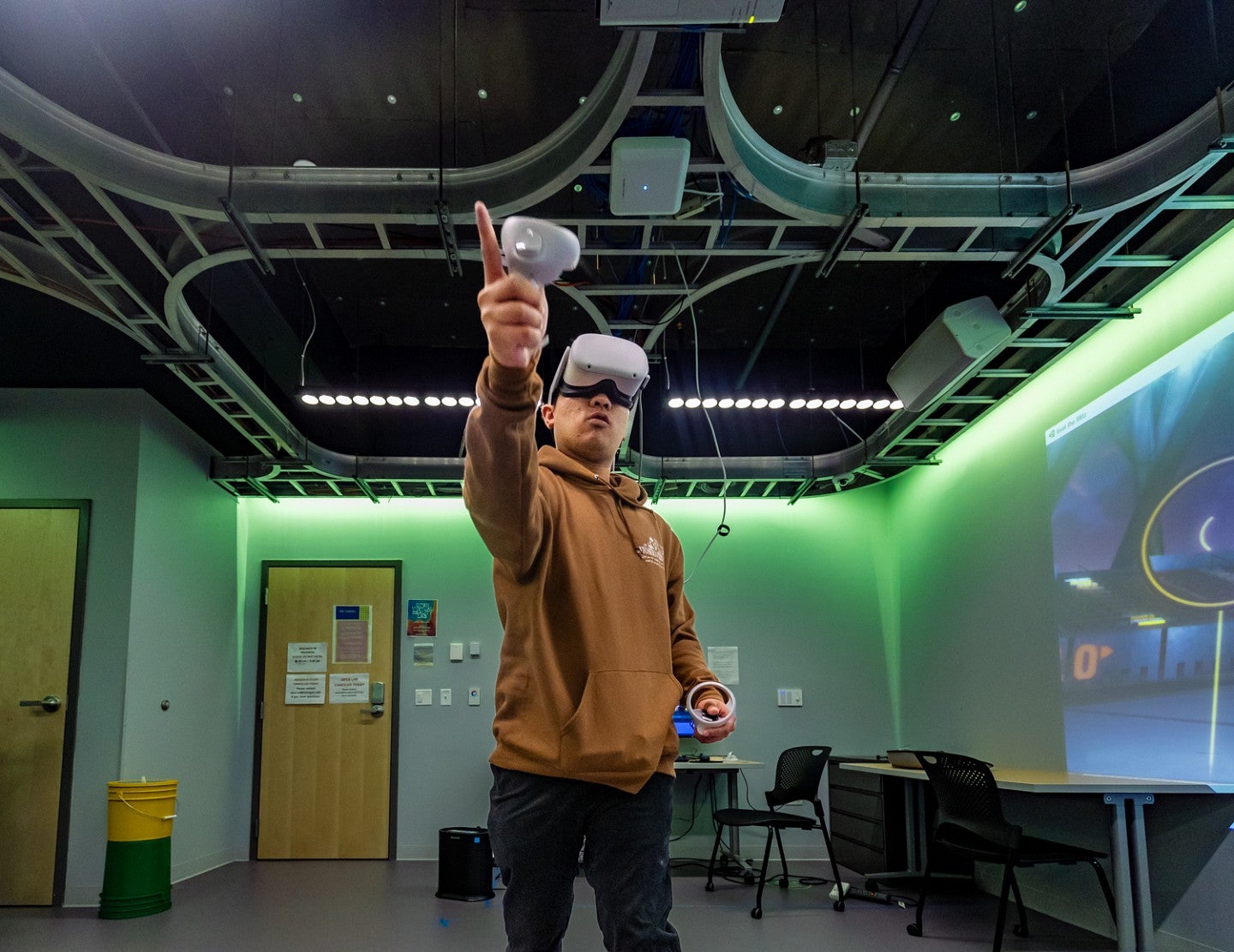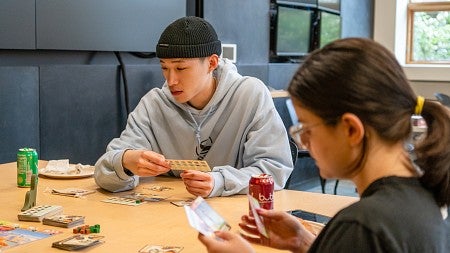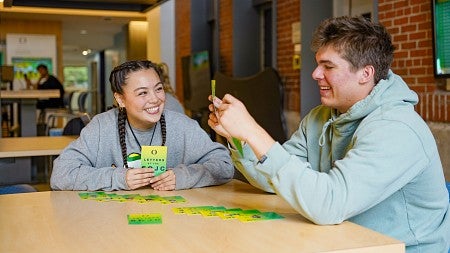
The game studies minor will give students a deep understanding of how games fit into journalism, advertising, public relations and media studies.
By Sydney Seymour, class of ’25
As new media formats expand and the gaming industry continues to explode, the UO School of Journalism and Communication (SOJC) has embraced the trend by adding a game studies minor.
“It will give students the skills to walk into any media profession — be it advertising, public relations, journalism, etc. — and excel in communicating about games as well as understanding the internal workings of games and game design so they can communicate within those spheres,” said Maxwell Foxman, director of the game studies minor and assistant professor of media studies.
Game studies is an interdisciplinary minor that focuses on the culture and practices of games and how they impact storytelling and media professions, said Foxman, whose research focuses on how games and play interact in nongame contexts and media professions.
In addition to advancing the game studies field, the minor provides an understanding of all types of gaming, from board games to esports, and delves into game design and how media outlets use games to inform and entertain. While other game-focused minors are mostly housed within computer science or design programs, the SOJC minor is unique in its media-rich experience and communications-focused approach, giving students a comprehensive understanding of how games fit into media professions, culture and society.
Game studies offers many career options
The game studies minor looks at the way games fit into our broader culture, going beyond just studying game design and programming, Foxman said.
While advertising majors might work for game companies, journalism majors could become games journalists. Public relations majors may gamify any campaign, and media studies majors can produce groundbreaking research on game culture and virtual reality, like what students are doing at the UO Esports and Games Research Lab (EGR Lab).

“Students will gain a deep understanding of different communities of play, different modes of gameplay and different ways of thinking about games,” Foxman said.
In addition, students will create games and playful spaces across various media.
“There are always opportunities to create more playful and more interactive types of stories,” he said.
Media studies major Jeff Clements ’25 is a research assistant for the EGR Lab, pursuing minors in medieval studies, folklore and game studies. He focuses on the history, media effects and community of both analog and digital games, with a particular interest in tabletop roleplaying games. His undergraduate thesis focused on Dungeons & Dragons (D&D) and the lack of a unifying theory around the aspects of D&D that were more elusive, like immersion and role-playing, he said.
Clements’ involvement in game studies came from the desire to contribute to a field he was already talking, writing and researching about all the time.
“Gaming and interactive digital storytelling mediums are, in a lot of ways, our frontier,” Clements said. “I get to explore this exciting, new digital world, and it feels really fulfilling to me.
“Games are a medium of communication with a level of interactivity that is unprecedented. We have a climate change board game night here where we use board games to talk about environmental issues. What is that if not communication?”
In Foxman’s Game Journalism and Newsgames class, Clements learned how games can be used to deliver news and discuss serious contemporary issues.

“Every student had three weeks to design a game based on a news topic,” Foxman said. “Subjects ranged from someone telling a personal story of their profession as a caregiver to another student who created a game about game journalism.”
One student created a news game called Press Freedom Pursuit. She relied on an interview with Katherine Corcoran, a former Associated Press bureau chief for Mexico and Central America and expert on press freedom, to design the game. The student took Corcoran’s practices and experience as an investigative journalist and built them into a choose-your-own-adventure game where players are journalists facing perplexing situations and decisions.
Games as economic drivers
On a broader scale games have been integrated into many aspects of media and everyday life since gamification entered the mainstream: Snapchat streaks, the Starbucks rewards system, Duolingo progress tracking, Wordle and other other New York Times games and news quizzes are great examples.
“Games are the economic drivers of the media industry,” Foxman said. “Most of us might have an iPhone or an Apple Watch, and there are so many components that are gamified like badges and prizes. I count my steps and compete against my friends. I know my students brag about their yearly Spotify Wrapped, which has to do with how many minutes they’ve listened to a particular artist compared to someone else.”
Public relations major Jaeden Gordon ’25 spends much of his time playing all kinds of games — sports, analog and digital — which is why he signed up for Foxman’s Introduction to Studying Games class, where he delved into what constitutes a game and what it means to play.
In the course, he learned how to design games and worked with a group to create a board game called Prison Break, a spin off Monopoly.
“It gave me perspective on how to develop the game based on what the audience thinks or how they’re going to feel when playing the game,” Gordon said. “We did a lot of trial and error. We worked to figure out what would appeal to different players and ways to make the games better.”
Game studies explores creativity, culture

The game studies minor consists of one introductory class on games, and then students choose five of eight courses within the SOJC ranging from the game industry and esports to analog games to subjects like virtual reality and the future of gaming. If students are more interested in design or programming elements, they can take art and design classes through the College of Design, which also count toward the minor.
The purpose of the minor is to prepare students to creatively, critically and culturally think about games and bring that skill to careers both within and outside of media industries to show the world how enriching games can be in everyday life, Foxman said.
Alumni have taken a variety of paths through game studies. One student started a podcast about esports and another created a virtual space to teach about the climate impact. And advertising alum Hailey Geller specializes in gaming campaigns across different studios at Microsoft Xbox.
“If you love games, if you know every sort of minor nuance or minor genre of games, this is a great way to understand it in more depth,” Foxman said. “If you’ve just played one game your entire life and you just want to know a little bit more, this is a way to expose you to that and to see how games and play are part of our everyday life.”
Sydney Seymour '25 (she/her/hers) is a media studies major minoring in ethics. She is a writing intern for the SOJC and the editor-in-chief of Align Magazine. Connect with her on LinkedIn.
